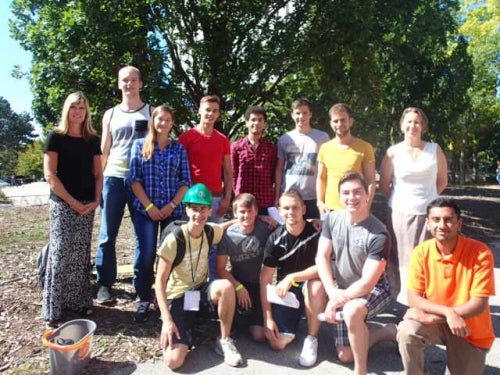By Andreea Perescu

Now in its seventh year, CANEU Co-op has won the 2016 British Columbia Council for International Education (BCCIE) award.
CANEU (which stands for CANadian European Union) is a unique co-operative education experience that partners two North American universities with two European universities. European students travel to Waterloo or Victoria, BC to study, while Canadian students travel to Germany or Austria on work terms.
Lisa ter Woort, one of four founders of CANEU Co-op and account manager, international, at Co-operative Education (CEE), says this is the story of four universities coming together to make a unique co-op program. “This all started when I took on a new role at the University in co-op. I was asked to go to a workshop in the U.S. to learn a little bit more about how co-op can be different at different universities,” said ter Woort.
At the workshop, ter Woort met a future founding member of CANEU Co-op: Johannes Haas from FH JOANNEUM University of Applied Science in Austria. Passionate about increasing international co-operative education, Haas and ter Woort parted ways with plans to collaborate in the future. In 2008, they came across a game-changing opportunity.
“I saw this item, and it caught my eye. It was essentially a pot of money from Human Resources Development Canada (HRTC), encouraging Canadian post-secondary institutions to form a collaboration with other institutions,” said ter Woort.
The grant aimed to increase student mobility internationally, and that’s just what CANEU Co-op set out to do – offer students the chance to branch out and develop their skills overseas. The timing had been perfect. Across the ocean, Haas had come across the same opportunity.
“It started in 2009, and we had funding for three years from the Canadian government. We applied for the $200,000. HRTC Canada received 48 applications and they funded eight. We were one of eight that received funding,” said ter Woort.
Ter Woort and Haas were joined by the University of Victoria, British Columbia, and Baden-Württemberg Cooperative State University Heidenheim University in Germany. “So we ended up with four partners and we put together a proposal. The key parts of the proposal involved three innovative things,” explained ter Woort.
The first was a winning concept that paired European students with Canadian students throughout the eight months program. The second focused on using research to further understand if international experience improves intercultural capability. The last component was piloting a hybrid agreement that would allow Canadian students to travel to Europe for work terms exclusively, while European students would benefit from study terms.
Having played a key part in building CANEU co-op from the ground up, ter Woort has helped establish a renowned program. The BCCIE award celebrates distinguished education leaders from across Canada and abroad.
“I’m totally excited how CANEU co-op was in itself a great opportunity to work with people at very different levels and different institutions, and to see how it did grow opportunities for our students,” said ter Woort.





